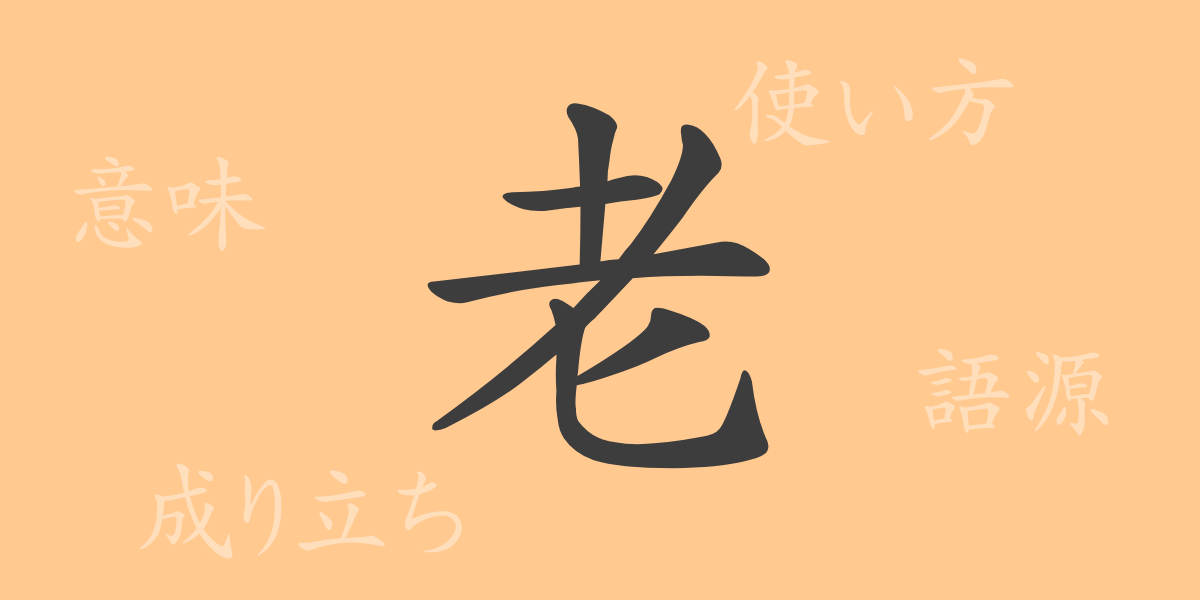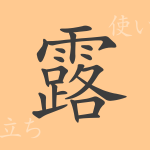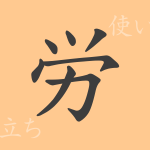The richness of the Japanese language is greatly shaped by its kanji (Chinese characters) culture. Each character holds profound meanings and histories, deeply rooted in the Japanese way of thinking and expression, revealing the depth of the language. This time, we focus on the 常用漢字(じょうようかんじ)(Jōyō Kanji) “老(ろう)(rō),” exploring its origin, meaning, usage, and even the idioms and phrases that include it. Let’s rediscover the charm of the Japanese language through this kanji filled with ancient wisdom.
The Origin (語源(ごげん)(Gogen)) of 老(ろう)(Rō)
The kanji “老(ろう)(rō)” is a pictographic character that represents the figure of an elderly person in ancient China. It mimics the form of an old person with a drooping head and a bent back, symbolizing the natural changes humans experience over time. This simple yet powerful visual image allowed ancient people to intuitively understand the concept of “aging.”
The Meaning and Usage of 老(ろう)(Rō)
“老(ろう)(rō)” is used to mean “aged” or “longevity.” It can also be used to refer to elderly people with respect. Additionally, it is used metaphorically to mean “lasting for a long time,” and its nuance varies depending on the context of the words.
Readings, Stroke Count, and Radical of 老(ろう)(Rō)
“老(ろう)(rō)” has multiple readings in Japanese, which are used according to the context.
- Readings: The 音読み(おんよみ)(On’yomi) is “ろう(rō),” and the 訓読み(くんよみ)(Kun’yomi) are “おいる(oiru)” and “ふける(fukeru).”
- Stroke Count: “老(ろう)(rō)” consists of 6 strokes.
- Radical: The radical of this kanji is “老(ろう)(rō),” and it serves as its own radical.
Idioms, Phrases, and Proverbs Using 老(ろう)(Rō) and Their Meanings
There are numerous idioms, phrases, and proverbs in Japanese that include “老(ろう)(rō).” These are utilized in various scenes, from daily conversations to literature and business.
- 老後(ろうご)(Rōgo): Refers to the latter half of life after aging, often indicating life after retirement.
- 老成(ろうせい)(Rōsei): Describes the state of being mature and having a deep understanding of things due to age.
- 老眼(ろうがん)(Rōgan): The condition of having difficulty seeing nearby objects due to aging.
- 老舗(しにせ)(Shinise): A store or company with a long history.
- 老若男女(ろうにゃくなんにょ)(Rōnyaku Nannyo): An expression that refers to all people, regardless of age or gender.
Summary of 老(ろう)(Rō)
The kanji “老(ろう)(rō)” carries meanings beyond merely representing age. It symbolizes the latter part of life, respect, and the richness of experience. Moreover, idioms and phrases that include “老(ろう)(rō)” in Japanese are fascinating for understanding the historical and cultural background of the language. Through this single kanji, one can glimpse the depth and richness of Japanese expression. By learning the wisdom of our predecessors through words, we who live in the present can also imbue new meanings into “老(ろう)(rō).”

























